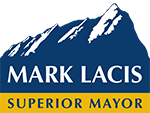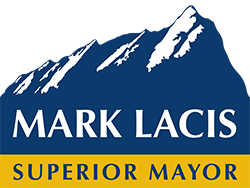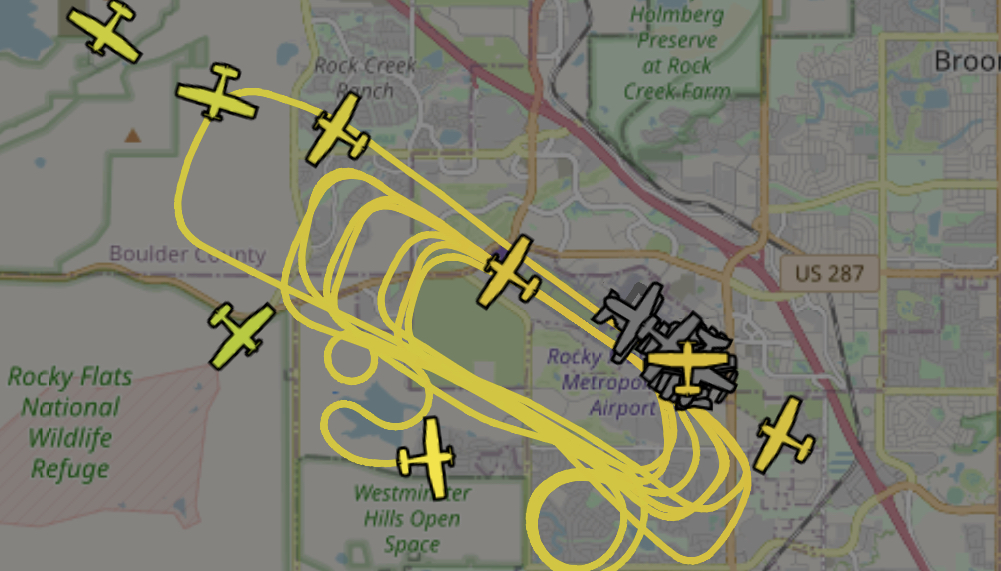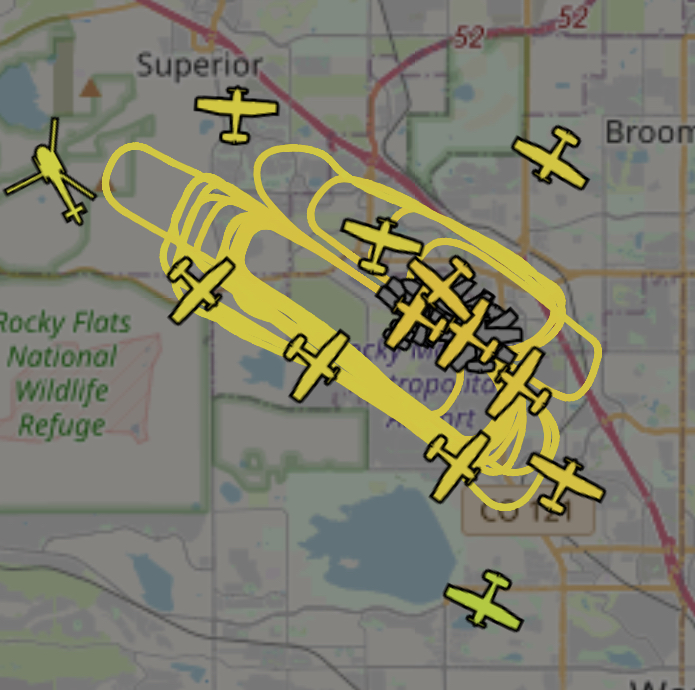Airport Update

July 2023
July 10, 2023
November 2023
November 14, 2023Introduction
Over the past several months, we have heard more and more complaints about increased noise from flight school traffic that is negatively affecting Superior. I’m hearing a lot of questions from residents who are asking “what are you doing about the airport?” This post is an effort to summarize what the town has been doing over the past several years, what we’re currently working on, and what we will do in the future in an attempt to address the airport and its impacts on Superior residents.
Background
Rocky Mountain Metropolitan Airport (RMMA) — formerly known as Jefferson County Airport — is owned and operated by Jefferson County. Established in the 1960s, the airport and the Town of Superior have generally coexisted for decades without incident. Over the past few years, however, aircraft operations have increased significantly, mainly from additional flight schools that have established a presence at RMMA. These flight schools primarily fly single-engine piston aircraft (i.e., Cessna 172 Skyhawks) which are noisy and use leaded avgas fuel.
There is nothing new about these types of aircraft flying over Superior. What is new, however, is the dramatic increase in the amount of planes flying over our homes. It is now common for 5-10 flight school aircraft to be flying in tight elliptical patterns over Superior and around RMMA (see picture above from this morning’s flight traffic around 10am), so pilots can practice touch-and-go landings and takeoffs. The effect of this practice is near constant aircraft noise over a significant portion of Superior homes for large portions of each day.
Understandably, many people have had enough. They are losing sleep, can’t peacefully work from home, and are unable to keep the windows open or enjoy the outdoors. To make matters worse, when they complain about the noise, those complaints are often dismissed by the airport administration, aviation community, and Jefferson County elected leaders with a “you shouldn’t have moved near an airport.” These types of responses aren’t helping the situation and many of our residents are at their wits’ end. As someone who lives under the flight paths, I feel their pain and share these concerns.
When I was first elected as a Trustee in 2016, the airport wasn’t an issue that we heard much about. It wasn’t an issue in the campaigns in 2016, but we have gradually started to hear more complaints. Unfortunately, the Town of Superior does not have jurisdiction over RMMA. The airport is owned by and located in Jefferson County. The airport and the airplanes that fly out of it are governed by Federal Law and regulated by the Federal Aviation Administration. Moreover, the Town is not a party to the Avigation Easements between the airport and Richmond Homes (who developed the Rock Creek Ranch neighborhood in the 80s and 90s). Since 2018, however, the Town has been working on a number of different ideas and potential solutions to address issues caused by RMMA. What follows below is an overview of what we’ve done so far and what we will be doing going forward. As always, if you have ideas or suggestions on what you’d like to see us try to do to address RMMA’s negative impacts, I’d love to hear them. Send the Town Board an email at townboard@superiorcolorado.gov.
2018
Superior Retains ABCx2 as a Consultant to Assist with Aircraft Noise Issues
In the Summer of 2018, the Town Board started hearing from more and more residents that aircraft noise was interfering with their quality of life and quiet enjoyment of their homes. At that time, the Town Board directed Town Staff to reach out to the airport director to discuss the situation.
On August 29, 2018, a community question-and-answer meeting took place with the RMMA airport director, Paul Anslow. The meeting was well attended by residents who wanted to voice their concerns, but the meeting lacked any commitment from the airport about follow-up steps that could be implemented to mitigate future noise issues. As a result, town staff began researching local and nationwide municipalities with established airport noise plans and advisory groups that could serve as a template should a program need to be formalized in Superior. This research led to a conversation with Jason Schwartz and Jim Allerdice with ABCx2 Consulting.
On November 27, 2018, the Town Board heard a presentation from ABCx2 regarding their proposal to create a realistic noise mitigation program that could be implemented at RMMA. As part of their approach, ABCx2 proposed a three-phased approach: (1) performing a baseline assessment of the problem; (2) developing a strategy with tangible solutions; and (3) implementing and monitoring the solutions.
Following the November presentation the Town Board asked staff and the consultants to revise the proposal to create tangible task orders with timelines and outcomes, and to bring an agreement back to the Board for further discussion. The Board also directed staff to reach out to neighboring jurisdictions to gauge their interest in participating in this project. Staff contacted Broomfield, Westminster, Arvada and Louisville, but only Louisville expressed an interest in partnering with the Town and sharing costs.
2019
In February 2019, the Board approved a contract with ABCx2, which included the following tasks:
- Identify and establish initial communication with airport stakeholders including airport staff, flight schools, airport tenants, FAA, and air traffic control personnel. Consultant shall include an assessment of the baseline conditions including a review of the airport facilities, airspace, traffic patterns, flight procedures, fleet mix, current noise abatement programs, and land-use/zoning around the airport and in proximity to dominant flight corridors. Provide a summary of the findings.
- Work in cooperation with airport stakeholders to implement realistic noise abatement solutions with initial prioritization focusing on flight schools operating out of the airport. Contractor shall help broker solutions that meet industry needs, are consistent with regulatory limitations, and help protect and enhance the local quality of life.
- Provide a list of noise abatement strategies and work plans detailing tasks, roles and responsibilities and implementation timelines. Provide technical support and ongoing engagement with airport stakeholders to ensure success. Contractor shall work on behalf of the Town and the City, advocating for the interests of the community as subject matter experts.
May 2019 Meeting & ABCx2 Baseline Assessment Report
At the May 13, 2019 Town Board Meeting, Paul Anslow — Director of RMMA — presented to the Town Board and the community on RMMA’s growth plans. In that presentation, Director Anslow represented that RMMA “wants to be good neighbors” and indicated that working with our consultant will create some good steps for the short-term and long-term. At that meeting, ABCx2 also presented their Phase 1 Baseline Assessment Summary Report. (Click here to read RMMA Superior Louisville Baseline Summary Report).
The Baseline Assessment Report begins with a historical overview of the development of the area and notes that “growth of the airport has exceeded early (community) expectations, resulting in increased community concerns and noise complaints.” The Baseline Assessment Report further identifies the following 5 flight schools which were operating at the airport at the time (including both fixed-wing (airplane) and helicopter training schools): McAir Aviation; Teebird Enterprises; Western Air Flight Academy; Rocky Mountain Flight School; and Colorado Heli-Ops. Since that time, ATP and Spartan Flight Schools have established flight school operations out of RMMA as well.
Ultimately, ABCx2’s Baseline Assessment Report showed us what many already knew — that the majority of airport traffic (and noise generated from it) comes from “touch and go” flight school/general aviation traffic. ABCx2 thus recommended developing strategies and working with RMMA and air traffic control to adopt strategies like raising flight pattern altitudes, adopting community-friendly ingress and egress pathways (to avoid Rock Creek), alternating/rotating runway usage, and changing the use of touch and go patterns. ABCx2 also suggested education & outreach to flight schools (instructors & students) and airport staff, as well as briefing to local pilots and flying clubs to encourage them to be mindful of the communities they fly over.
Over the course of the months that followed, the consultants continued working on developing strategy recommendations and worked with the Town Board to host an Airport Noise Mitigation Open House on July 24, 2019 to continue to keep the community informed of the work that was being performed. ABCx2 continued to compile community input and feedback; finalized short, medium, and long-term strategies for reducing aircraft noise impacts; and developed an implementation plan with input from industry leaders including the airport, air traffic control, flight schools.
Town Survey
In conjunction with ABCx2, the Town surveyed its residents to better understand the impact that the airport was having on those who lived here. The survey was open during the summer of 2019 and closed in the fall. On September 25, 2019, the Town published the survey results. Not surprisingly, 84.3% of the survey respondents indicated that aircraft noise was a concern. 32.1% stated that the noise had a (5 out of 5) high impact on their quality of life, with another 30.5% indicating a (4 out of 5) impact on their quality of life. Propeller aircraft were cited as being the most “bothersome” type of aircraft flying over Superior and most residents indicated that 7am-5pm was the biggest problem time during the day. 49.4% of residents responded that they were bothered by aircraft “everyday” with 62.4% representing that the problem has gotten much worse.
Joint Meeting with Louisville & ABCx2 Strategy Recommendations Report
On September 30, 2019, the Superior Town Board held a joint meeting with the City of Louisville regarding noise and flight traffic and heard ABCx2’s presentation of their Phase 2 Strategy Recommendations Summary Report. (Click here to read RMMA Superior Louisville Final Report – Strategy Recommendations).
The strategic recommendations were broken down into five individual, but interdependent areas: (1) Flight Procedures, Practices, and Policies; (2) Community Outreach and Engagement; (3) Industry Outreach and Engagement; (4) Land-Use Planning and Development; and (5) Regional Collaboration.
The Strategy Recommendations Report provided a list of implementable improvements to flight procedures, practices, and policies, including:
- Routing aircraft away from residential areas when possible
- Increasing altitudes when overflying noise-sensitive/residential areas
- Reducing nighttime operations
- Early turns to avoid residential areas
- Encourage close-in (tight) patterns for touch-and-go operations
The Strategy Recommendations Report also suggested increasing communications with community members and encouraging land use decisions that encouraged compatible development in surrounding areas. The Strategy Recommendations Report also focused on improvements for pilots, flight schools, airport administration, and air traffic control:
- Inform flight schools, pilots (local and visiting), air traffic control, etc., about the community impacts associated with aircraft operations and noise.
- Expand awareness of practices and procedures to reduce noise impacts.
- Expand awareness of the airport Fly Quiet Program and encourage participation.
- Involve industry in expansion and improvement of the airport noise program.
- Develop/enhance flight training curriculum to include noise abatement and Fly Quiet Program awareness to encourage compliance. Include RMMA-specific information as well as noise abatement information in general.
- Develop training curriculum for flight instructors (i.e. train the trainer) and provide training on at least a quarterly basis. Training should be developed for new flight instructors in addition to refresher training.
- Develop noise abatement awareness training curriculum for air traffic controllers. Training should be developed for new controllers in addition to refresher training – provided annually at a minimum.
- Host pilot forums to promote awareness of the RMMA noise abatement program. Pilot forums should be promoted to encourage both local/RMMA-based pilots as well as regional pilots who frequently visit RMMA. Forums may be hosted by the Airport or airport tenants. Forums could also be paired with FAA Safety Team (FAAST) Workshops.
- Expand information on airport website regarding clarity on noise-sensitive areas around RMMA and the practices and procedures for reducing noise impacts.
- Develop a technical working group to include air traffic control, airport staff, Airport Advisory Board, flight schools, other airport businesses. The technical advisory group will focus on technical review of new and refined noise program measures.
Finally, the Report recommended regular meetings with RMMA and surrounding local governments, as well forming various roundtables focused on regional and airport planning, a technical advisory committee, and a community roundtable focused on airport operations and noise.
In the months that followed, RMMA published new noise abatement procedures — Fly Quiet Program — stemming from community input and the work of Superior and Louisville’s consults, ABCx2. These procedures are available here. (A copy of the PDF of the Fly Quiet Program brochure is available here: RMMA Voluntary Noise Abatement Brochure). The Fly Quiet Program includes a number of procedures, which if implemented would have a positive impact on the surrounding community, including Superior. In particular, the Fly Quiet Program states:
- Climb out at best angle of climb (Vx). This ensures that aircraft are as high as possible before leaving the airport perimeter.
- Reduce RPM when safe. Lower propeller speeds produce less noise.
- Fly standard or higher glide path. Shallow approaches expose neighborhoods to additional noise.
- Overfly major road corridors and/or open space when able. Absent ATC instructions to the contrary, choosing routing that avoids residential neighborhoods lessens the impact of aviation operations on surrounding communities.
- Runway 30R is designated the primary, calm-wind runway. Westerly prevailing winds favor 30 the majority of the time.
- No intersection departures. Using the full length of the runway is both safer and ensures aircraft are as high as possible before leaving the airport perimeter.
- Maintain pattern altitude of 6,500’ for single engine aircraft and 7,000’ for twins/turboprops/jets.
- No engine maintenance run-ups between 10:00 p.m. and 6:00 a.m. except in an emergency.
- Flight schools, located on field, have voluntarily stopped departures in the evening hours beginning at 10:00 p.m. local time. Aircraft from the flight schools shall not depart after this, excepting when required to do so for currency or training in accordance with federal regulations.
(emphasis added).
Unfortunately, while the Fly Quiet Program has a number of good suggestions, it is either not being communicated to the pilots and flight schools operating out of RMMA, or if it is being communicated, it is being ignored.
2020
COVID Pandemic & Work From Home
COVID-19 entered the conversation in the U.S. in January 2020, when the Centers for Disease Control and Prevention reported of an outbreak abroad. Later that month, the first national case of COVID-19 was reported in the US. By March 2020, the World Health Organization (WHO) had declared COVID-19 a global pandemic and many of us began working remotely, from home. What does COVID-19 have to do with airport noise? In my opinion, this is when we really started to hear an increase in noise complaints.
Before we were all working from home, most of us commuted to Denver or Boulder, or wherever our offices were. Between the hours of 8am and 6pm, most of us weren’t bothered from noise from airplanes because we didn’t hear the noise, we were either at work, or traveling to/from work. But after COVID entered the picture, things changed. All of a sudden, we were all working from home. And when things shut down, one of the few things we could do was take walks around the neighborhood. So, while aircraft operations were increasing, there were also more residents home to hear the noise generated by increased operations.
In June 2020, the consultants worked with Superior and Louisiville to publish A Guide to Understanding Airport Operations and Aircraft Noise. This webpage was developed to help educate on airport operations and policies/procedures and to address common community concerns and questions.
In July 2020, Superior and Louisville’s consults — ABCx2 — gave a Progress Report. In the Progress Report, ABCx2 reported the following:
- Flight training operations (departures) are discouraged after 10:00 PM. Federal regulations prohibit the airport from implementing a mandatory curfew, however, the flight schools have agreed to discourage departures after 10:00 PM daily.
- The clear top priority identified by Louisville and Superior involves working toward implementation of flight practices and procedures that pilots can follow which will reduce their noise impacts on residential communities. Specific examples included discouraging nighttime operations, avoiding overflight of residential areas, increasing altitudes when overflight of residential areas is unavoidable, encouraging earlyturns on departure (when practical to avoid overflight of residential areas), and encouraging the use of community-friendly routes when transitioning to and from the practice areas north of RMMA.
- Thus far, several of these elements have been incorporated in the RMMA noise program, “Fly Quiet”. The Airport has reached out to the local flight schools, all of whom agreed to discourage departures for training purposes after 10:00 PM nightly.
(emphasis added.)
The Progress Report then concluded that an “important next step is the formation of an Airport Noise Roundtable.”
In October 2020, the Superior Town Board adopted a resolution to approve an intergovernmental agreement and bylaws to establish the Rocky Mountain Metropolitan Airport Community Noise Roundtable. This was proposed to us, and the community, as the next step in collaboration among seven local government entities, the airport and the FAA, as a means to identify solutions regarding airport noise impacts.
Community Noise Roundtable Established
As a result of the work and recommendations from ABCx2, an Intergovernmental Agreement (“IGA”) establishing the Rocky Mountain Metropolitan Airport Community Noise Roundtable (“CNR”) was entered into, effective December 1, 2020, and signed by Superior, Louisville, Broomfield, Arvada, Westminster, Boulder County, and Jefferson County. Lafayette subsequently was added to the CNR as well.
According to the IGA which established the CNR (Fully Executed RMMA Noise Roundtable IGA), its purpose is to:
- Identify the dimension of noise issues, discover possible mitigation actions, find opportunities for implementation of mitigation measures, and evaluate the effectiveness of the mitigation measures;
- Share up-to-date data in order to identify potential voluntary noise reduction opportunities;
- Identify potential operational changes to the Airport that would require federal approval;
- Build consensus around recommendations for noise reduction measures, whether voluntary or mandatory (understanding that mandatory measures require FAA approval);
- Review available data regarding noise reduction measures; and
- Review Airport development plans, operational changes and surrounding community development plans for associated noise impacts.
2021-2022
On January 11, 2021, the first meeting of the newly formed Rocky Mountain Metropolitan Airport Community Noise Roundtable was held. I ran for and was elected by the members to serve as the Chair of the CNR for its first 2 years. I did this because I wanted to make sure that Superior had a seat at the table in influencing the focus and direction of the CNR. I was initially hopeful that we’d be able to make progress through the CNR. On its face, the CNR seemed like the best chance for regular communication with RMMA staff and its owner, Jefferson County… and with regular communication, the possibility of achieving tangible results for Superior. But it turned out to be an incredibly challenging and frustrating job.
Hindsight being 20/20, the CNR was destined for failure from the start. The CNR had no staff. Initial dues were $3,600 per each member government — with a total budget of $25,500. We met once a month, for 2 hours, and had a lot of topics to discuss. While we were initially assisted with consultants who helped facilitate meetings, one of the consultants resigned less than a year into the job.
We also had a substantial number of topics that we wanted to discuss: developing a work plan, hearing from the FAA, implementing flight path changes, landing fees, noise complaint monitoring systems, and considering the recommendations from ABCx2’s reports. But because we had no staff and limited time to address issues during our 2-hour meetings, most of the work fell on the shoulders of the members of the CNR themselves. Some of those members were more active than others. Others simply showed up to the meetings without having read the meeting packets and were unprepared to substantively participate in the conversations.
It also became clear that it would be difficult, if not impossible, to achieve consensus amongst roundtable members. There were some members of the CNR who thought that noise was a problem, whereas others did not. In my opinion, some members of the CNR acted as apologists for the airport and frustrated any efforts to seriously pursue noise calming measures. And for those of us who believed that noise was a problem, even amongst this group there were differences of opinion as to where the noise should go — some of us wanted the planes to fly over areas that were not residential (including commercial, industrial, and open spaces areas) whereas others strongly opposed routing any traffic over open space areas at all.
Another challenge of the CNR was due to the fact that for the first year of its existence, we were meeting remotely due to the COVID-19 pandemic. That led to less collegiality and participation amongst members. And although the CNR eventually increased its dues so it could hire consultants to help it research the various topics on its list of work plan discussion items, that process alone occupied months of the roundtable’s meetings.
In addition, we spent a great amount of time over 2022 working towards an agreement to raise the member dues from $3,600 to $12,000. We worked to raise the dues so the CNR could be sufficiently funded so that it could then hire consultants who could actually help us do the job that CNR was designed to do. This proved to be an incredibly challenging task, but we finally accomplished it in June 2022. Now, the CNR is funded and has been able to retain consultants. Although even that task — hiring specific consultants — proved a politically challenging obstacle to overcome within the CNR itself. It’s my hope that now with funding and support from consultants, the CNR can get to work on important issues, like the development of maps of noise sensitive areas which would be distributed to pilots/flight schools so they avoid impacting residential areas.
Lastly, although the CNR was set up as a forum to hear from the public and take public comment, in my opinion, this essentially allowed RMMA to outsource the noise complaint process to the CNR. Understandably, the public would complain to the CNR (instead of filing complaints with the airport itself), but this allowed RMMA to use the CNR as cover and allowed RMMA staff and leadership to ignore addressing the public’s legitimate concerns.
Nevertheless, the CNR continued and still continues its work. You can visit the CNR’s website and look through past agenda, meeting minutes, attachments, and watch recordings of the meetings themselves.
In my opinion, if the CNR is to serve any useful purpose, I would like to see it immediately take steps to make recommendations to RMMA to adopt practical and effective noise reduction measures including but not limited to: implementing landing fees, closing runways at night, limiting or discouraging touch-and-go operations, exploring curfews, and implementing flight path changes that avoid residential areas.
If RMMA receives such recommendations from the CNR and ultimately decides not to follow the recommendations, the CNR should be dissolved.
2023
Town of Superior Requests & Jeffco Responses
Over the past several months, due to frustration with RMMA, Jefferson County, and the inability of the CNR to achieve any tangible results, the Town of Superior has begun making separate requests of RMMA.
First, on April 18, 2023, the Superior Board of Trustees sent a letter to the Administrator of the FAA and the Jefferson County Board of County Commissioners requesting RMMA to make unleaded aviation fuel available at RMMA and to take steps to phase out leaded fuels as expeditiously as possible. (That letter is available here: Letter from TOS_with_DocuSign_Leaded_Aviation_Gasol). Disappointingly, on May 10, 2023, the Jeffco BOCC responded to our request (which is available here: 2023 05 10 BCC Leaded Fuel Response To Superior FINAL) and did not demonstrate any commitment to attempting to phase out leaded fuel sales before the FAA and EPA requires them to.
Separately, on July 21, 2023, 6 of the 7 members of the Town of Superior Board of Trustees sent a letter (available here: RMMA Letter Complete with_DocuSign 7.21.2023) to the Jeffco BOCC, RMMA Director Paul Anslow, and FAA Denver Airports District Office Manager John Bauer. This letter was also sent to five flight schools operating out of RMMA, as well as the U.S. Senators and Representatives who represent the area impacted by the airport. The letter asks that five immediate operational changes be implemented to address noise and lead pollution: (1) imposing landing fees; (2) enforcing a curfew; (3) closing Runway 30L/12R at night; (4) restricting touch-and-go operations; and (5) banning leaded fuel sales.
On August 16, 2023, the Jefferson County BOCC responded to our letter (available here: 2023 08 16 Town of Superior Letter FINAL). In its response, the Jeffco BOCC did not seem willing to entertain any of Superior’s requests, but more concerningly, it did not offer any counter-proposals which would reduce aircraft noise, although it did seem to indicate that it was taking some steps and seeking Federal grants so that it could offer unleaded fuel for sale at some point in the future.
Next Steps
Despite the responses we have received from Jeffco, I have asked for a joint meeting with (1) Jeffco BOCC; (2) RMMA Director Anslow; (3) FAA Manager Bauer; and (4) all flight schools operating out of RMMA. I am asking for a public meeting with all of these parties where we will ask 2 simple questions: (1) Do they believe there is a noise problem? (2) If yes, what do they intend to do about it? In my opinion, the answers to these simple questions will be revealing. It wouldn’t surprise me if several of these parties do not believe there is any noise problem at all — and instead, simply will rely on the fact that Superior is located near an airport, and as a result, our residents should just deal with it.
Separately, on the question of lead, the Town has engaged a contractor to conduct lead testing at multiple locations throughout Superior. Results will be published soon. As an aside, due to the increased concerns raised by community members about lead and its affects on children, my wife and I had our children tested. Their blood tests came back and there was no detectable amounts of lead in either child.
Trustee Jason Serbu (who is the current liaison to the RMMA CNR), has been diligently working on alternative flight path options for the flight schools that are flying in and around Superior. On July 26, 2023, Trustee Serbu held a community meeting at the Superior Community Center which was well attended by the public. Since then, he has continued to meet with flight schools and the FAA to receive feedback and buy-in to see if the flight schools would voluntarily adopt alternative flight paths for their training pattern. Trustee Serbu is slated to report to the Town Board at our upcoming August 28, 2023 Town Board meeting.
In addition, on September 18, 2023, the Town Board will be holding its quarterly Work Session. At that meeting, I will propose that the Board create a new advisory committee which will be focused on airport issues. We currently have several advisory committees which deal with parks/rec, open space, youth issues, historical issues, cultural arts & public spaces, environmental sustainability, and planning. These advisory committees serve a valuable function and are able to spend the time to focus on important issues and in turn, can then provide recommendations to the Town Board so we can make informed decisions. Given the impact that the airport has on our community, there are a lot of residents who feel strongly about the issue, are passionate and deeply knowledgeable about the issue, such that we would benefit from having their perspective to help shape our decision-making. I hope my fellow Board members will join me in forming this new advisory committee at a future date.
Finally, the Town Board held an executive session related to RMMA issues on July 10, 2023. The Town continues to explore all available options that it may have to remedy the nuisance and pollution caused by the increased flights out of RMMA. We remain committed to fighting to protect the health, safety, and welfare of our residents.
—————
Submit Public Comment to the FAA!
The Federal Aviation Administration (FAA) is currently taking public comment related to aircraft noise policies. Please take a moment and submit your feedback online on the FAA’s Noise Policy Review webpage. The deadline to submit comments has been extended through September 29, 2023.
For more information, I encourage you to visit the Town’s webpage for RMMA Issues.





